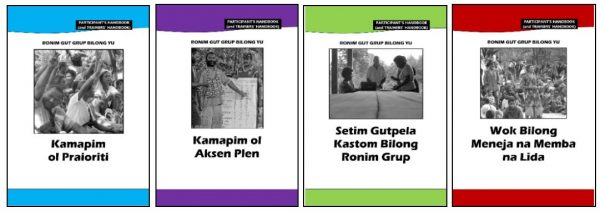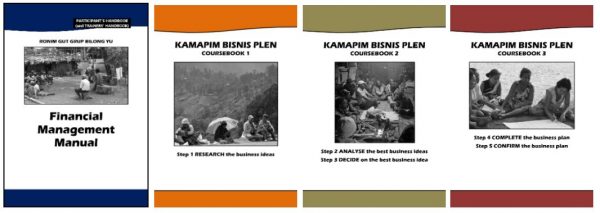Starting in 2015, CARE International in Papua New Guinea worked with the Department of Provincial and Local Level Government (DPLGA) to substantially revise the government’s bottom-up planning mechanism, based on lessons learned implementing ward development planning in Obura-Wonenara District, Gumine District, and Menyamya District. The result, endorsed by DPLGA in 2016, is a simple community-led planning tool that helps Ward Development Committees (WDCs) to start planning their own development. The tool enables them to articulate what they want to do together, what they can do themselves, and what help they need. The approach is participatory, inclusive, builds local capacity, encourages self-reliance, and promotes social accountability.
The revised (2016) ward development planning process re-imagines a WDC as both a community-based organisation and an arm of government. Every five years ward communities analyse their development situation in terms of seven priority government sectors (education, health, economy, law and justice, disasters, community development, and transport infrastructure). Ward communities can include other sectors (or “missions”) that are locally relevant if they choose. Ward communities then prioritise what they can do themselves to achieve each of the sectors (called “road A”) and what outside help they might need to achieve each of the sectors (“road B”). The top priorities in each sector are then scored again using the following categories; amount of people in the ward who will benefit, benefit to women/girls, benefit to youth, use of local assets and resources, benefit to the environment, chance of being sustained, benefit to other wards. The highest scoring top priorities for road A and road B are then included in the ward profile, which feeds up into the government’s bottom-up planning mechanism.
The overarching message in the revised ward planning approach is that the district and/or its partners will do their best to assist with road B priorities, provided the WDC tries its best to coordinate or implement the ward’s own road A priorities. The better the WDC is at leading their own development, and the more evidence they accumulate to show they can do it, then the more attractive they become to external organisations able to help with road B priorities. WDCs can also market their ward profiles directly to the District Development Authority, civil society organisations, resource industries, companies, and extension agencies. The 2016 version of the new Ward Development Planning handbook can be downloaded here.
Although DPLGA has not yet had the opportunity to roll out their revised (2016) ward development planning approach, the simple community-led planning tool, at its heart, has been further developed by CARE International in PNG and the Australian Centre for International Agricultural Research (ACIAR) as a tool to help any community group, not just WDCs, lead their own development. Community groups identify and confirm their missions, they identify priorities to achieve the missions that they can implement themselves (road A), and they identify priorities to achieve their missions that will need outside help (road B). This information is then included in a simple organisation profile which they can use to market themselves (if they need outside support) to districts, companies, resource industries, extension agencies, and civil society organisations. This link shows an example of an organisation profile developed by a farmer group in Metuyufa Village, Ward 2, Goroka District.
This planning tool for community groups is simple enough for them to lead for themselves every five years, as part of a normal organisational planning. To support the model, CARE International in PNG and ACIAR have developed a series of organisational strengthening (strongim grup) training materials to help community groups (and WDCs) follow road A (over five years) and put their own priorities into practice. The materials include training to help community groups develop a business plan (developed by ACIAR in partnership with the PNG National Development Bank). The materials target Community Development Workers (pastors, field officers, community volunteers, district officers, community liaison officers, Ward Development Committee and Community Government representatives, extension officers, Boards of Management, and others). These materials help Community Development Workers build the capacity of all the members of a community group, not just the leaders and managers, by breaking down complex concepts and processes using analogies, visual symbols, and metaphors. Increasing the basic understanding of how to run an organisation among all the members of a community group is essential for building trust within the group. The materials also highlight the ways in which a government organisation should function in the same way as a community organisation, helping community groups to act politically and hold the government to account. The organisational strengthening training materials to help community groups (and WDCs) follow road A and put their own priorities into practice can be downloaded here.
The series of organisational strengthening training is being used by a number of organisations in PNG, including the Fresh Produce Development Agency, CARE International in PNG, Ok Tedi Development Foundation, and the Coffee Industry Corporation. They have used these training materials to build the capacity of family-based and larger small and medium enterprises, church groups, community school boards, cooperatives, associations, women’s groups, youth groups, and incorporated land groups. Below is a selection of representative comments from officers trained to use the materials.
“One of the world’s best bottom-up approaches for community building. To prepare community to be self-governing and group strengthening in PNG” (Coffee Industry Corporation officer)
“Thank God that this is the missing link to Coffee Industry Corporation’s productivity plans to sustain groups” (Coffee Industry Corporation officer)
“The approach is very useful and a perfect tool for both small and big institutions” (Fresh Produce Development Agency officer)
These same organisations have also built the capacity of their Community Development Workers (CDWs) by using competency-based training that targets the PNG National Standard for CDWs, to give their CDWs a professional identity, and the common minimum skills and knowledge to work in ways that are community-led, participatory, inclusive, encourage self-reliance, and build local capacity. The CDW training materials can be downloaded here. For more information on the PNG National Standard for Community Development Workers please visit its website or the National Apprenticeship and Trade Testing Board.
The new tools for community-led development we have described are ideal for external organisations (districts, companies, resource industries, extension agencies, civil society organisations) that want to set up structures and approaches for working with community groups that are community-led, participatory, inclusive, encourage self-reliance, build local capacity, and promote social accountability. Evidence of the value has so far been encouraging. Over time (with support from external organisations) community groups become better at following road A and putting their own priorities into practice, they accumulate more evidence that they can do it, and they therefore become more attractive to external organisations that can help them with their road B priorities. Over time, structures and approaches that promote community-led development turn around the expectation and intense pressure on external organisations to bring change.





Great achievement through Community based development is very important and special way in serving communities in the rural areas of Papua New Guinea and I am greatly in support and congratulate you all for your contribution in every capacity
I find this interesting in the approach being undertaken, with particular focus at the local level. This is an area that require more attention, hopefully such steps as these paves the way forward in giving shape to development thought and practice.
The concept of “participation” needs to be rethought, a theme that remains at the heart of any development discourse.
I have a lot to share but would keep it short. This is an area I am passionate to learn and contribute, hopefully in the near future towards the development of our beautiful PNG.
I will leave with few questions here: It is widely acknowledged that development encompass a growing set of interrelated themes such as technological choice, the environment, basic needs, human development, and participatory research and action, etc … what really is the purpose and direction of development? Will a new direction ever be set if the generality of PNG citizens be considered mere beneficiaries of projects rather than the real protagonists of development? And can this change come about in the institutional vacuum that characterises the life of such a vast number of human beings?
Why the enhancement of institutional capacity among rural populations and the inhabitants of poor urban neighbourhoods has been neglected by so many development plans in PNG is a question for which I have never had an adequate answer.
I would be happy to learn from these kind of development efforts, the nature of the development thought and practice and what possible next steps can be taken in our country.
I have recently visited this site and find the document super interesting. For an ordinary individual who cannot be able to reach out to such educational tools to build them in their economic growth, this is a wonderful page.
Great job team and keep up the good work of serving our people who needs such intellectual minds.
An excellent and timely article. When 85% of people live rurally and beyond the reach of government services, it is logically sound to focus greater effort and resources at local levels. Congratulations to the team.
Thanks Writers (Chris), Bennie, Debbie, Charles & Priscilla). Firstly, this website is second to none from the perspective of community development. It’s very helpful and contains invaluable information for community development workers and associates. The information contained on the site are easily accessible, easy to read and understand, and also practically usable.
The piece of writing reading the training at Aiyura is insightful and great! For organizations such as the CIC, who directly works with farmer groups, the Aiyura training was very useful for the extension staff: many thanks to Chris and team CARE for delivering this important training. Confirm with your report that the training really filled in a missing gap between the extension officers normal way of extension (innovation driven) and the farmers (who have specific needs which are often overlooked); hence the gap. In the goings forwards of the CIC, especially in extension and training, under its (CIC) new strategic and business plans (2020 – 2030), obviously the new tools of CDW will be used. Looking forward to getting for updates and possibly make contributions. Especially to Chris, thanks for committing your life for community development in PNG.